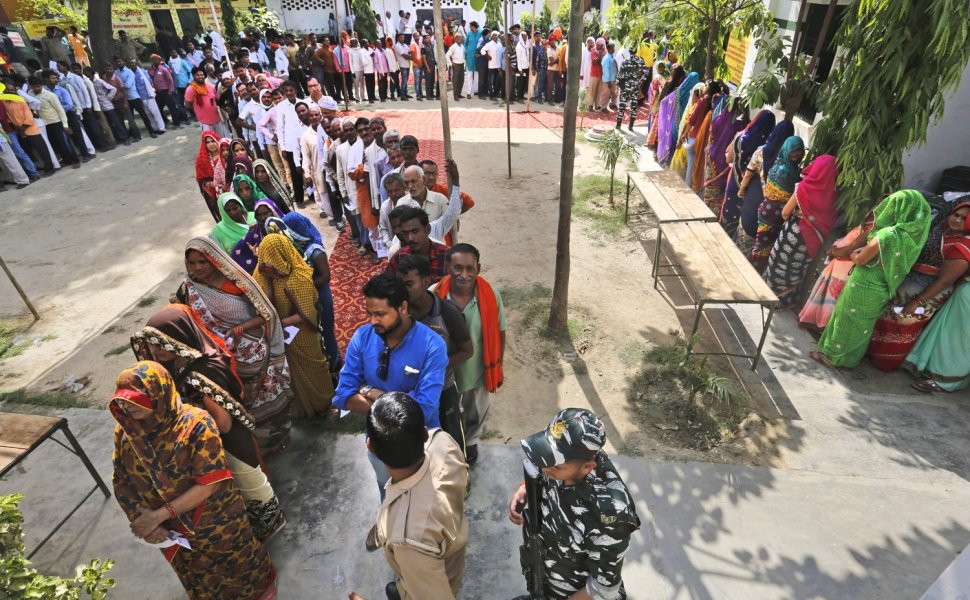Event Recap: What to Make of India's Election Results?


At the close of the Indian election last month, Narendra Modi, the incumbent Prime Minister, won re-election with a significant margin. On May 28th, Michael Kugelman, Deputy Director of the Asia Program, hosted a Ground Truth Briefing examining the implication of the Indian election. Iain Marlow, a Bloomberg correspondent based in New Delhi, Narayan Lakshman, an associate editor for The Hindu newspaper in Chennai, and Nirupama Rao, a former Indian ambassador to the United States and China and a Wilson Center fellow based in Bangalore, joined the discussion.
“The size of the mandate is surprising, but the result I don’t think is surprising to anyone who was reporting on this election.”
Kugelman started the conversation with the question of how people have reacted to the election results. Marlow believed Modi has successfully appealed to general voters in India. “People trust him. They like him, and they voted for him,” Marlow said. “The size of the mandate is surprising, but the result I don’t think is surprising to anyone who was reporting on this election.”
Lakshman elaborated that the mechanism leading to this resounding win is a complex combination of Modi’s popularity, the BJP’s substantial financial resources and effective social engineering, as well as the Indian people’s changing identity—As the importance of caste decreases, religion seems to be ascending to the most defining factor for individuals in India.
Rao agreed with Lakshman and Marlow and added that, since the overwhelming mandate demonstrates across-section support for the nationalist leader, it is evident that a cultural revolution is taking place in India, and this trend requires further observation and analysis.
Marlow stated that Modi tweeted about an inclusive India when the election concluded, but slammed secularism in his victory speech. Although whether the BJP would continue promoting Hindu nationalism in the next five years remain unclear, “the Muslim minorities in West Bengal were fearful,” said Marlow, “because they watched reports on what had happened in other parts of northern India.” Small-scale violence against Muslims has emerged in the North and lent an increasing sense of insecurity to religious minorities in India.
The panel then discussed the Modi administration’s potential domestic policies in the new term. Lakshman noted that, while Modi may keep certain religious and social agendas, his priority is likely to be economic development, such as job creation and infrastructure development. Marlow mentioned that investors generally welcomed Modi’s win since policy consistency is a positive factor for businesses. Whereas the decrease in domestic consumption before the election raised some concern, the direction of the Indian economy under Modi is relatively clear.
Rao weighed in on India’s economic policies and highlighted that the next few months would be extremely crucial for Modi’s administration. She illustrated that, as educated Indian youth have a hard time finding jobs, Modi’s promise of changing the situation was one of the incentives for young voters to endorse him.
As Kugelman navigated the conversation into India’s foreign policies in the next five years, he summarized that, as India and China experienced rising geopolitical rivalry, the relationship between the United States and India strengthened, especially in defense cooperation. In the backdrop of the increasing tension between the United States and China, the role of India can be critical in this dynamic.
Rao noted Modi generally gained credits in foreign relations in his last term, but there has been turbulence in the Indian neighborhood that is not necessarily favorable, including the relationship with China. Rao elaborated that India’s trade deficit with China and China’s rising presence in India’s neighboring countries poses challenges to the Modi administration. For example, China’s growing influence in Pakistan can add complexity to the Kashmir issue.
“New developments in India-China relations indicates that many changes are required.”
“The Rajiv Gandhi’s consensus with China that developed in 1988, thirty years ago, has essentially exceeded its shelf life,” said Rao. “New developments in India-China relations indicates that many changes are required.” She suggests that high-level dialogues and connections between India and China, such as the meeting between Modi and Chinese president Xi Jinping in April 2018, are beneficial for the on-going transformation of India-China relations.
Rao stated that, unlike the relationship between the United States and many of its allies, the relationship between the United States and India had not been damaged after Trump became president. As for the potential disagreement on trade, Rao believed it would not become a significant problem as long as both sides address the issue with maturity and wisdom.
As the conversation on Indian foreign policies continued, the panel discussed India-Pakistan relations and the Kashmir issue. “Serious efforts are required to counter radicalization,” said Rao. “That means to initiate structural programs that bring together civil society members, family groups, educationists, religious leaders, and even surrendered terrorists to roll back radicalization.”
Follow the Asia Program on Twitter @AsiaProgram. or join us on Facebook.
The views expressed are the author's alone, and do not represent the views of the U.S. Government or the Wilson Center. Copyright 2019, Asia Program. All rights reserved.
Guest

Indo-Pacific Program
The Indo-Pacific Program promotes policy debate and intellectual discussions on US interests in the Asia-Pacific as well as political, economic, security, and social issues relating to the world’s most populous and economically dynamic region. Read more
